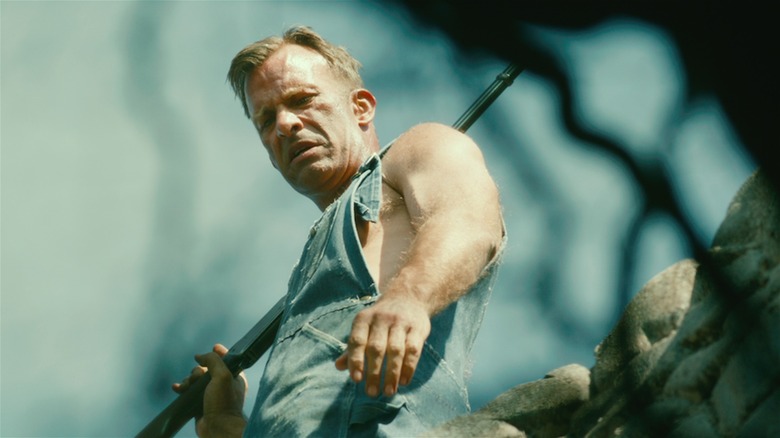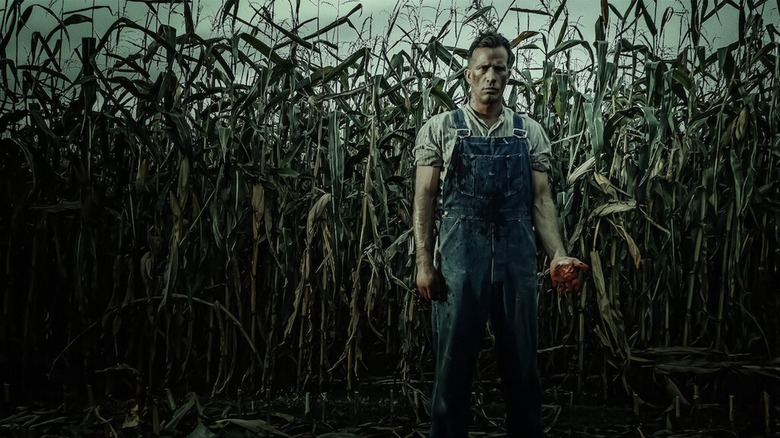“Here is something I learned in 1922: there are always worse things waiting. You think you have seen the most terrible thing, the one that coalesces all your nightmares into a freakish horror that actually exists, and the only consolation is that there can be nothing worse […] But there is worse, your mind does not snap and somehow you carry on.”
These chilling words grace Stephen King’s novella “1922,” originally published as a part of his collection “Full Dark, No Stars” before getting a stand-alone release in 2017. The inspiration for the novella’s setting was found in the photographs attached to Michael Lesy’s nonfiction book “Wisconsin Death Trip,” which evoked a sense of rural desolation and harshness, contributing to the narrative’s gritty and brutal tone. Such a visceral aura is tough to replicate in a visual adaptation, as the power of words often falls short when transported to a medium so reliant on fluctuating atmosphere and evocative cinematography. However Zak Hilditch’s “1922” successfully captures the distinct feel of the novella, with most of the heavy lifting being done by the film’s solid, grounded performances and an escalating slow-burn that keeps us on edge.
In a conversation with Vulture, King talked about what makes a good adaptation work, explaining that some stories fare better when the creators closely follow the source material, which explains why adaptations like “Gerald’s Game” and “1922” are so satisfying to experience:
“A lot of times, I feel like the filmmakers are better off if they follow the arc of my stories closely. Now, maybe that’s egocentric, but that’s the way I feel. With ‘Gerald’s Game’ and ‘1922’, they both follow the course of the books pretty closely, and the films that these guys made stand and fall on that.”
King was pleasantly surprised by Netflix’s 1922
When asked whether he’s pitched with adaptations of his work or if he offers advice for the best way forward, King stated in the same interview that while that’s not his job, he holds a deep love for most of the adaptations nonetheless. King clarified that he is always supportive of anyone who wishes to create something based on his work and that the pitch for “1922” surprised him, given how challenging it was to replicate the novella’s harsh, uncompromising tone:
“With ‘1922’, was I a little surprised that somebody wanted to make it? I was, and I was also pleased by the challenge of it and anxious to see what would come out. And you know, what ‘1922’ reminded me of was a film called ‘There Will Be Blood’. It has the same kind of flat, dead-eyed, effect to it, so it made for a really good suspense picture, and it’s a movie that won’t leave my mind. It has this sort of poisonous effect, it just sort of sticks there because some of the images are so good.”
What makes Netflix’s “1922” work is its focus on the terrifyingly gradual moral rot Wilfred James (Thomas Jane) experiences, with the symbolism of the rats gnawing at the fringes of the harrowing tale that unfolds. There are no shock-value jumpscares or cheap thrills employed to demand audience attention, but instead, a lean, mean saga of murder and betrayal is allowed to reach a dizzying climax, with the strongest aspects of King’s writing shining through.
It is not a perfect film by any means, especially if King’s novella is your frame of reference, as some aspects can feel underwhelming, while others, exhausting. It is still one of the better King adaptations over the years.








